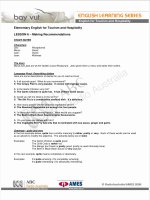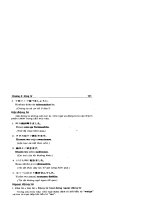4eSample poster 6 evaluation
Bạn đang xem bản rút gọn của tài liệu. Xem và tải ngay bản đầy đủ của tài liệu tại đây (19.63 KB, 2 trang )
The Effects of Different Fertilizers on Brassica rapa
Reid, Frazier, Lau, Allen
Presented in an introductory course for non-majors at Bucknell University
Layout and Appearance
Criteria
Positive
Negative
APPEARANCE: Is the poster neatly constructed? Do the text and the figures stand
out against the background? Are colors
and fonts used consistently? Is the text
large and legible from 3–6 feet away?
SECTIONS: Does each section begin with
a descriptive heading? Is there sufficient
space between sections? Do the sections
naturally flow from top left to bottom
right?
BALANCE: Is there a nice balance between text and figures? Is there too much
text?
PROOFREADING: Is the text free of typos and grammatical errors?
Poster is neatly
constructed.
Nice use of colored paper for contrast.
Font size is large
and legible.
Each section has
a descriptive heading.
Good use of
space.
Layout flows
from top left to bottom right.
Good balance
between text and
figures.
Content
Criteria
Positive
Negative
TITLE: Does the title grab your attention?
AUTHORS: Are the authors’ names, affiliations, and contact information provided?
INTRODUCTION: Were the objectives
clearly stated? Do you understand why
this study was done? Did you get enough
background information to understand the
system? Were any abbreviations defined
for the general visitor? Were the hypotheses rational?
METHODS: Were the methods described
clearly and concisely?
RESULTS: Were the graphs easy to understand? Were any graphics distracting?
CONCLUSIONS: Do the conclusions
match the data? Are reasonable ideas put
forth to explain the observed patterns? Is
there a clear connection between the conclusions and the original objectives?
Hypotheses are
clearly stated in the
introduction.
Methods are
clearly described.
There is a clear
connection between
the objectives and
the conclusions.
Possible explanations are given for
the results.
Potential sources
of error are pointed
out.
Title is descriptive, but does not
hint at the results.
For Latin names of organisms,
capitalize the genus (Brassica), make
the species name lower case (rapa),
and italicize both.
When stating a hypothesis, use
“we hypothesize” or “we expect”
instead of “we believe.”
In the methods, do not describe
routine procedures such as “The first
step…was to plant the seeds” or
“Over the course of the experiment,
all of the data was recorded on a
chart.”
Include a ruler as a scale bar in the
photos. Add a caption to emphasize
the important results.
Graph format:
Always graph the data points. Delete
the gray background. Choose dark
colors for lines and symbols (the yellow line on the gray background is
barely visible). The x-axis scale
should be spaced proportionally. To
Reduce amount of text by using
bullets for the main points.
Handwritten authors’ names and
figure date look sloppy with everything else typed.
Writing style is wordy and there
are some grammatical errors (“The
number of leaves…were was…”).
do so, use “scatter” not “line” as the
chart type in Excel.
In the results section, the exact
date is not needed since the experiment was done in the lab.
The Conclusion section should be
called “Results and Conclusions.”
The results are described in only
general terms (“least amount of
growth,” “biggest growth,” “growth
and development.” You spent a lot of
time measuring plant height, leaf
length, number of leaves, and internode length—describe how the different fertilizers affected these specific aspects of growth.
The usual heading is “References” or “Works Cited,” not “Resources Used.”









